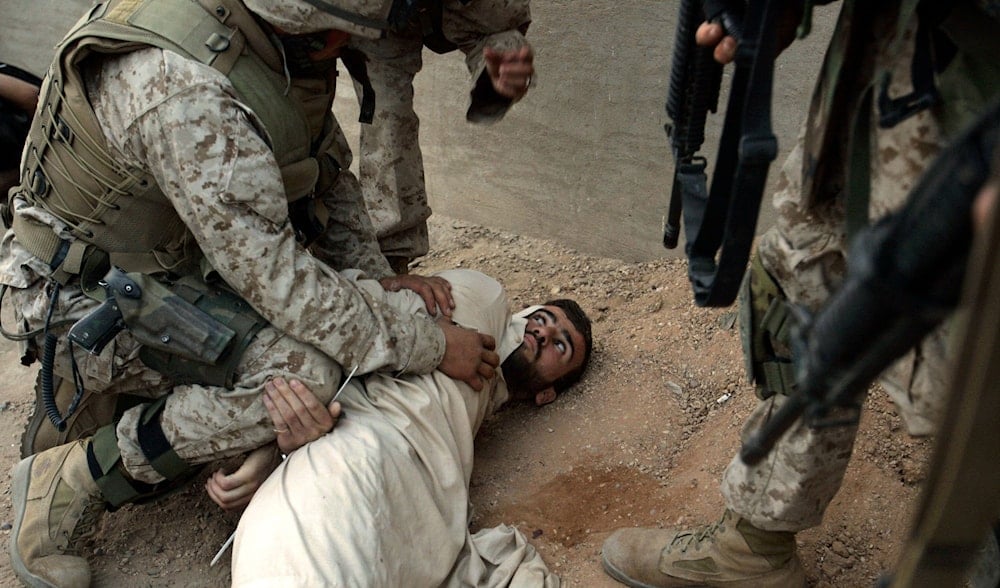Haditha massacre: US troops newly implicated in civilian murders
New evidence implicates US Marines in the 2005 Haditha massacre, where 24 Iraqi civilians were killed. A BBC investigation and survivor testimony raise serious questions about accountability.
-

US Marines of the Fifth Division detain an Iraqi man in the center of Fallujah, Iraq, Thursday, Nov. 11, 2004 (AP)
Nearly 20 years after US Marines massacred 24 civilians in the Iraqi town of Haditha, new evidence has emerged raising serious questions about the official investigation and the lack of accountability for the killings.
Safa Younes, the only surviving member of her immediate family, was 13 years old when US forces raided her home and opened fire, killing everyone inside except her.
The killings, part of the Haditha massacre, were among the most notorious incidents of the US occupation of Iraq. Despite initial charges against several Marines, no one was ultimately convicted.
Deliberate civilian killings
On November 19, 2005, a US convoy was hit by a roadside bomb that killed one Marine. In the hours that followed, US troops entered multiple homes in Haditha and opened fire, killing civilians, including women and children. Among them was Safa’s family.
She and her siblings were hiding in a bedroom with their mother and aunt when Marines entered and opened fire. Her father was shot at the front door. Safa survived by pretending to be dead.
“We hadn’t been accused of anything,” she told the BBC. “We didn’t even have any weapons in the house.”
Immunity granted, charges dropped
Four Marines were initially charged with murder, but three were granted immunity in exchange for testimony. Charges were eventually dropped against all except Staff Sergeant Frank Wuterich, the squad leader.
His case ended in a plea deal in 2012, in which he admitted to a single count of negligent dereliction of duty, unrelated to any of the deaths.
The most junior Marine, Lance Corporal Humberto Mendoza, admitted in a pre-trial hearing that he shot Safa’s unarmed father when he answered the door. He was never charged.
Forensic expert links Marines to execution-style killings
Forensic expert Michael Maloney, deployed by the US Navy to investigate the massacre, analyzed crime scene photos from Safa’s home and concluded that two Marines entered the bedroom and fired at close range, killing the women and children.
Newly surfaced testimony from Mendoza places him inside the room, contradicting his earlier statements. Maloney noted that Mendoza’s position matches that of the first shooter. “Mendoza confessed to everything except for pulling the trigger,” he said.
Another Marine, Lance Corporal Stephen Tatum, gave multiple conflicting accounts. In one, he admitted to shooting a child despite recognizing him. Tatum was also not prosecuted.
Read more: 'US forces never held accountable': Iraqi father seeks justice for son
Survivors, experts criticize US handling of investigation
Military prosecutors were widely criticized for mishandling the case. Witnesses who were granted immunity were also among the key suspects. Safa’s own video testimony from 2006 was never presented in court.
Wuterich’s military lawyer, Haytham Faraj, said the process was designed to protect the institution, not deliver justice. “The trial of Haditha was never meant to give voice to the victims,” he said. “No one being punished — that was always the plan.”
Ongoing calls for accountability
Now 33, Safa still lives in Haditha and has three children. She has spent nearly two decades waiting for justice.
“Those who did this should have been held accountable from the start,” she said. “It’s been almost 20 years without a trial. That’s the real crime.”
The Haditha massacre remains one of the clearest examples of how US military intervention in Iraq left behind a trail of civilian casualties with no meaningful accountability. Despite overwhelming evidence and survivor testimony, those responsible were allowed to walk free, shielded by a system unwilling to hold its own to account.
The US invasion of Iraq, launched under the pretext of weapons of mass destruction and the promise of democracy, resulted in widespread destruction, mass civilian casualties, and long-term destabilization. Tens of thousands of civilians were killed in airstrikes, raids, and ground operations.
The occupation saw repeated incidents of torture, massacres, and indiscriminate violence, such as those in Abu Ghraib, Fallujah, and Haditha, each exposing a pattern of impunity within the US military ranks.
Read more: Job of US Marine corps was killing people: Iraq War veterans speak up

 4 Min Read
4 Min Read










